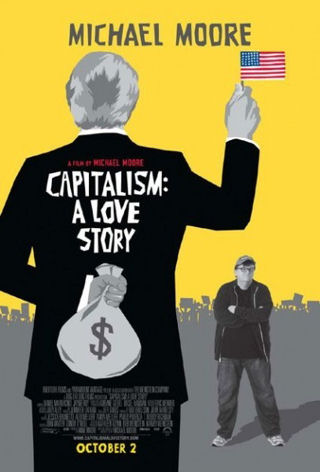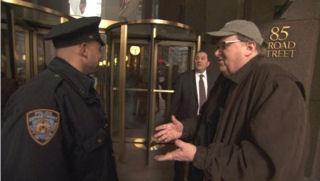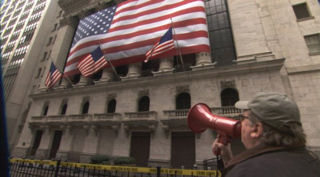Capitalism:
A Love Story Oh
Michael Moore, why do you have to be such a rabble rouser?
It seems like every movie you do is controversial and tackles
heavy subjects in American politics. With Roger &
Me you took on the corporations, Bowling for Columbine
was about Gun Control, Fahrenheit 911-the war on
terror, Sicko-the health care industry and now
with your latest film, Capitalism: A Love Story
you go out and take on one of the biggest issues of your
career, the economy.
What
are you trying to do Mike? Can’t you just leave well
enough alone? Or are you seriously acting like the Beatles
song and saying you want a revolution?
Say
what you want about Michael Moore. Love him or despise him,
one thing’s always apparent: he gets people talking.
Usually a standard mouthpiece of the liberal left, Moore
mostly plays the part of scapegoat for right-wing conservatives,
and for the most part it’s deservedly so.
However
with his latest film, Capitalism: A Love Story,
Moore does something unique, at least for him, and speaks
more from the middle. And by middle, we’re mostly
talking about the middle class that has been decimated and
beaten by the current economic landscape. Speaking for the
common man is nothing new to Michael Moore, but Capitalism
feels like his most non-partisan effort yet.
He’s
not necessarily going after the Republicans, and he isn’t
necessarily hailing the Clintons as the second coming. The
antagonists in this film aren’t any politicians; they’re
the banks and Wall Street and the major financial institutions
that just last year were begging for a government hand-out.
Moore is searching for the cause of our economic downfall
of the last few years and he makes a good case for what
he’s found.
Though
his films are usually filled with arch humor, Capitalism
is probably Moore’s least funny movie, especially
when it comes down to the stories of the different families'
plights he documents. These are salt of the earth types,
real American families, and they all discuss how they’ve
been effected by years of unregulated greed and financial
misconduct.
Moore
also expands on how good things used to be and how that
since things have changed that it might now be impossible
to change back.
Capitalism
is a finely crafted expose and it quite possibly could be
Moore’s best work yet. Whereas Sicko was
slow and blaming, Capitalism is still long, but
just full of information, heartbreak and anger. Looking
at it from just a film-making standpoint, taking all politics
out of the piece, it’s a strong, powerful documentary
that creatively makes its points and moves smartly.
It’s
also very personal, probably Moore’s most personal
journey since 1989’s Roger & Me. Featuring
lots of old, super 8 film of a young Michael and his family,
Moore opens up and shows that even though he’s a successful
film maker he and his family also bear the scars of Capitalism’s
grasp.
Capitalism is a jarring film, one that’s
intended to make the average American angry and upset. In
it, Moore once again makes strong claims against Wall Street
and how greed, money, corruption and power have taken over
the very spirit of Democracy. It’s also that spirit
that he’s trying to rekindle inside every average
American who can only sit back and watch to instead stand
up and revolt and he evens shows what happens to a family
who does just that.
The
film is not without fault. While Moore touches on the responsibilities
of the government and the financial institutions, he fails
to focus much on personal responsibilities. One could argue
that when seeing certain personal stories of some of the
people in this documentary, that Moore talks very little
about the people’s personal responsibility. Maybe
some of the problems these people are facing are of their
own doing. However, if there’s a person with any compassion
for humanity, they’d have a hard time dismissing the
American family who lose the legacy farm in foreclosure.
So Michael
Moore, it looks like you did it again. You got America talking
again and this time hopefully they’re thinking, too.
Except this time you might have more people listening to
you, considering that when it comes down to money and the
bad economy, it doesn’t just affect Democrats but
Republicans as well.
Capitalism:
A Love Story is a strong movie and a powerful call
to arms and like that Beatles’ song, you say you want
a revolution and with this movie, who knows Mike, you just
might get it.
|








